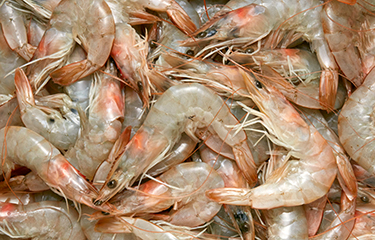Ecuadorian President Lenín Moreno has sent a letter to his Chinese counterpart, Xi Jinping, asking the latter to find joint solutions on the temporary sanction that Beijing imposed on three Ecuadorian shrimp farms, prohibiting exports to the country.
“We support our shrimp exporters, which have safety and biosecurity protocols recognized by the Chinese government. I sent a letter to President Xi Jinping to find joint solutions, normalize the situation and maintain our international prestige in that market,” Lenín announced on Twitter.
The Latin American leader has reason to be concerned. On 10 July the General Directorate of Chinese Customs announced the suspension of three Ecuadorian shrimp companies – Industrial Pesquera Santa Priscila, Empacreci, and Empacadora Del Pacifico – from exporting to the country. According to reports from Chinese health authorities, samples taken from one of the internal walls of a container transporting Ecuadorian shrimp tested positive for COVID-19, as well as on the outer surface of five boxes from these companies.
Since that time, new reports have been published in China of COVID-19 being found on Ecuadorian shrimp packaging – typically on the outside of boxes. China Daily reported the same discovery of COVID-19 a second time on 15 July, and health commissions in other parts of the country have now reported positive findings of COVID-19 related substances on the outside of shrimp packaging. None of the instances of the virus have been found on shrimp or inside packages.
“We continue to support the shrimp sector,” Lenín posted a day after his first tweet. “I visited @SantaPriscilaEC to verify the great biosecurity work responding to COVID. We have deployed a strategy and set of actions to protect employment and exports. Let’s drive the economy!”
Ecuador’s shrimp industry production has climbed steadily over the past decade, from 151,000 metric tons (MT) in 2010, representing USD 850 million (EUR 744 million) in exports, to 645,000 MT in 2019, representing USD 3.9 billion (EUR 3.4 billion). It is the country’s second largest export after oil.
China is the main destination for Ecuadorian shrimp, with the Asian country having purchased USD 510 million (EUR 447 million) in the first quarter of 2020 alone. Shipments to China by the three banned companies represent about 30 percent of all shrimp exports to that country.
The suspension hits even harder when considering that just the previous month, Ecuador’s National Aquiculture Association (CAN) announced a strategic cooperation agreement with China’s Yellow Sea Fisheries Research Institute, which the former hailed as “an important step in international cooperation for shrimp aquaculture biosecurity.”
“Ecuador confirms that food exports comply with all biosafety protocols. The notification from the Chinese customs does not constitute a sanction to the country, nor to the Ecuadorian shrimp in particular. Exports continue to flow,” Production Minister Iván Ontaneda posted on Twitter.
However, there are similar, recent precedents that may indicate the contrary. After health authorities found COVID-19 on fish-chopping boards in Beijing’s Xinfadi seafood market – the epicenter of a new cluster of infections – Chinese seafood shoppers were spooked by the supposed linkage between salmon and the coronavirus. Despite proof that there was no connection, sales of imported salmon plummeted, with the fear being exacerbated by top Chinese medical experts warning the public to avoid eating salmon.
Now, many of Ecuador’s shrimp producers expressed concern that although the ban only targets three companies, consumers could stop buying the product altogether.
One businessman told the Global Times newspaper that none of his shrimp suppliers in Ecuador is on the list of suspended firms, but now customers are refusing to accept merchandise brought in from the South American nation, even after safety checks.
In this case, the company has 80 containers of shrimp in the northern Tianjin municipality and another 50 on the way, for a total value of more than CNY 100 million (USD 14.3 million, EUR 12.5 million).
While sales of Ecuadorian shrimp and Norwegian salmon have dived in response to Chinese fears of COVID-19 contamination, customs slowdowns from added inspections are affecting all seafood exports to China. Longtime industry members in the region have told SeafoodSource that numerous containers have been held up due to extensive COVID-19 testing.
Photo courtesy of LIU ANLIN/Shutterstock







